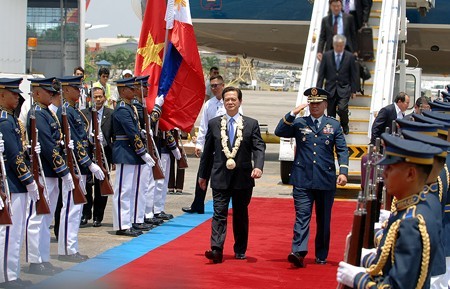(VOVworld) – Prime Minister Nguyen Tan Dung is attending the World Economic Forum (VEF) on East Asia in the Philippines, along with some 450 delegates who include world political, economic and social organization leaders. The forum is a venue for Vietnam and other countries to boost initiatives and cooperative frameworks to improve the forum’s quality and Vietnam’s relations with WEF member countries.
 |
Prime Minister Nguyen Tan Dung arrived in the Philippines (photo: VGP)
|
East Asia is considered the locomotive of the global economic recovery amidst such challenges to the world economy as unsteady and unbalanced economic recovery rates. Emerging and developing economies are experiencing slower growth rates than before the crisis - an estimated 4.9% this year and 5.3% next year. This year’s WEF on East Asia, themed “Leveraging Growth for Equitable Progress”, aims to achieve resilient development and regional connectivity.
East Asia’s economic role in the world
Nguyen Duc Thanh, Director of the Vietnam Center for Economics and Policy Research of the Vietnam National University, said East Asia plays an important role in the global economy in terms of scale and dynamism. The total output of East Asia, which includes the major world economies of Japan, China, and South Korea and the dynamic markets of Taiwan, Hongkong, and Singapore, is 30% of the world’s total. The region’s trade also makes up one third of total global trade. Thanh said: "Both the Southeast and Northeast Asian regions have recorded rapid and uninterrupted economic growth for a long time. East Asia quickly rebounded after the crisis. This region, a highlight in the global economy, has attracted a large capital flow."
A challenge for East Asia is that the local economies depend largely on exports. The global economic crisis, which spread from the US and Eastern European countries, strongly impacted other economies. More than ever, East Asian nations have to reform their growth model, expand domestic markets, and improve their competitiveness, in addition to receiving large investments from other countries.
Creating opportunities in the integration process
While the global economy is recovering, investors will seek stable new markets. East Asia has become a lucrative market and attracted heavy investments.
Vietnam has enhanced its regional integration and worked with other ASEAN nations to build an economic community in 2015. Through ASEAN cooperative mechanisms and the WEF on East Asia, Vietnam has promoted its image as a dynamic and integrated country and offered incentives for businesses to access trade opportunities. Vietnam has 13 economic groups and corporations which are member of the WEF, including the Vietnam Oil and Gas Group, FPT group, Vingroup, and VinaCapital. Mr. Thanh again: "Vietnam has an advantaged position in ASEAN and East Asia connectivity. In the integration process, trade and investment barriers have been reduced and connections established with faraway places. Businesses should specify their production and Vietnam must promote its staple products."
Actively contributing to the success of the East Asia Economic Forum
In recent years, Vietnam has proactively participated in the WEF on East Asia, considering it an important part in its international integration policy. Vietnam successfully hosted the WEF on East Asia in 2010 in Ho Chi Minh city with the theme “Rethinking Asia’s leading Agenda”. The Vietnamese Prime Minister attended the WEF on East Asia in Thailand in 2012 and in Myanmar in 2013. Vietnam has always been an active participant in economic reform initiatives, regional integration and connectivity, and responses to development challenges.